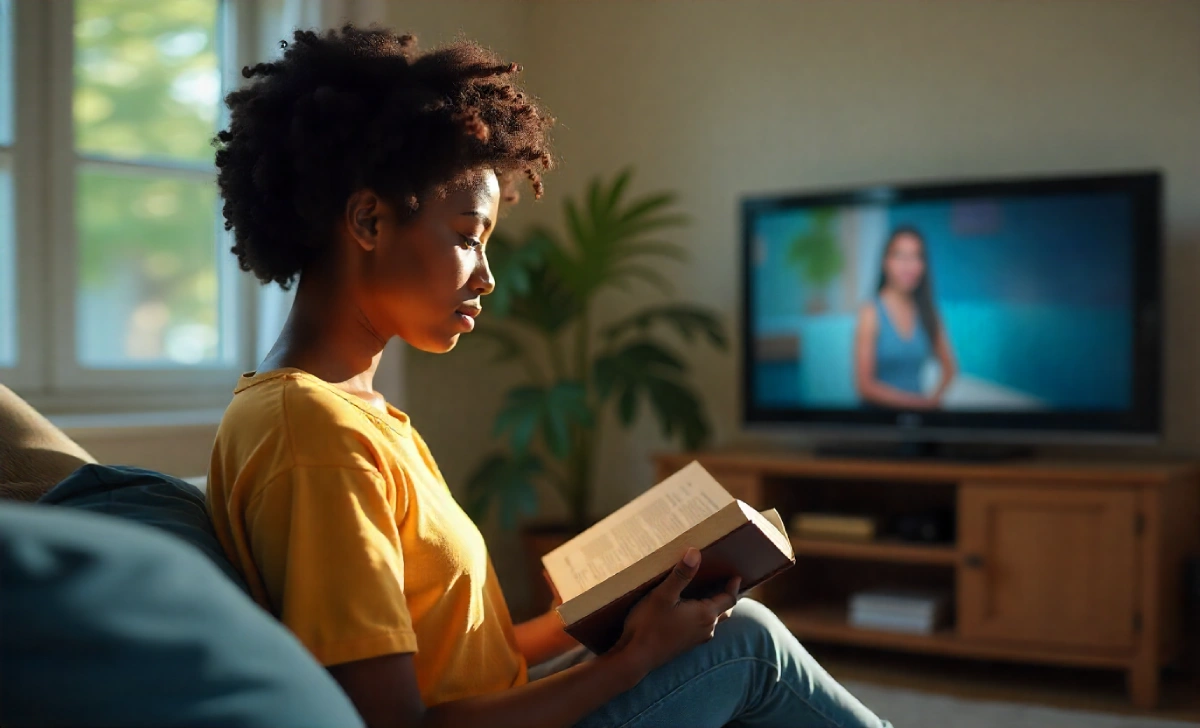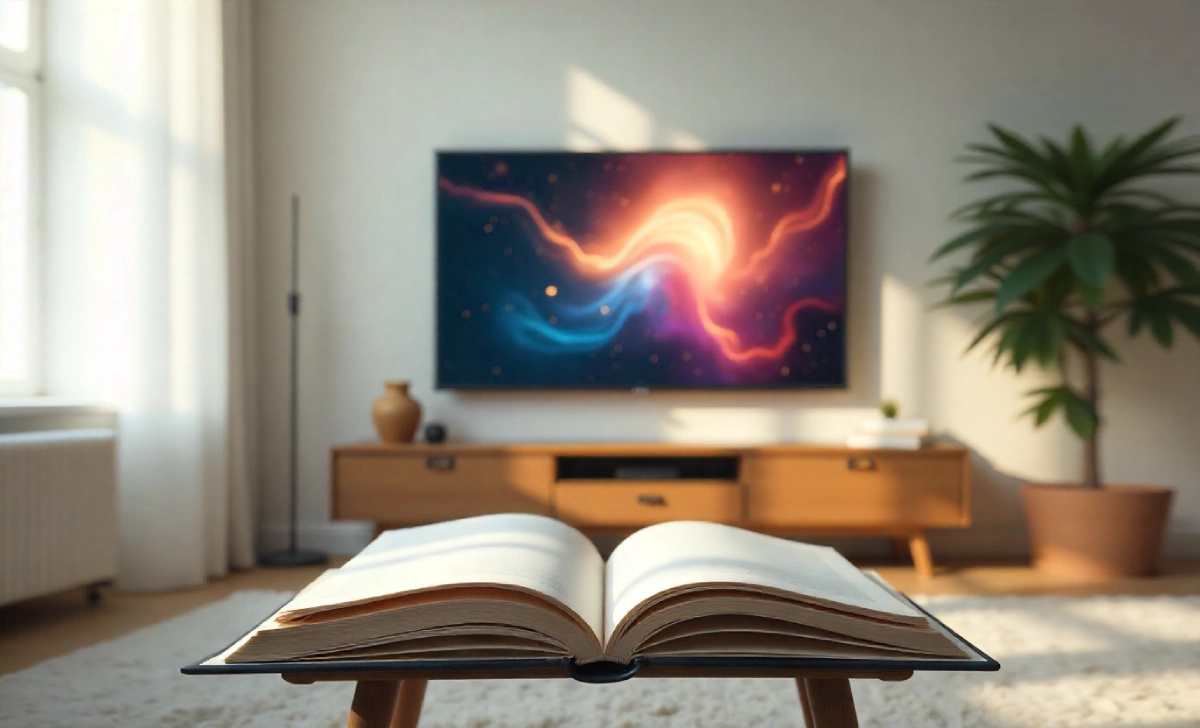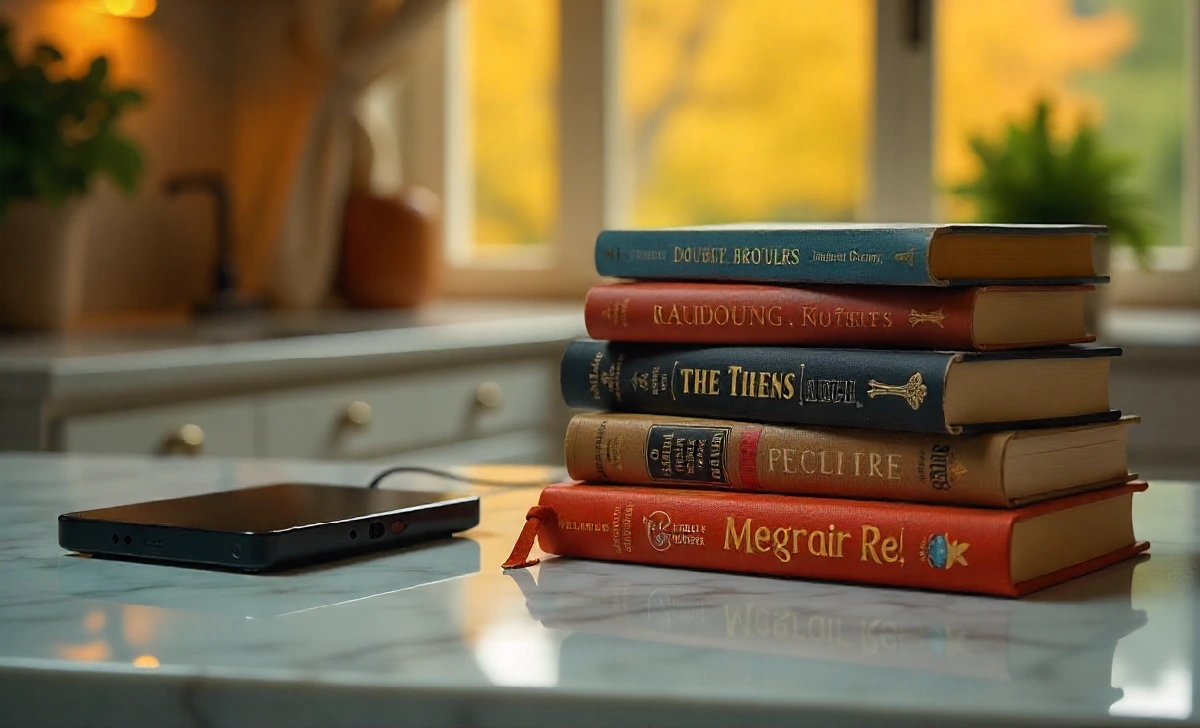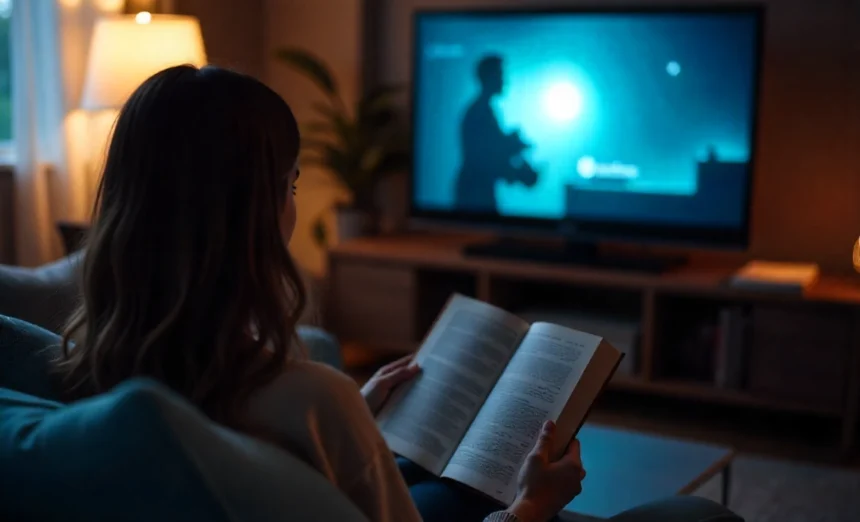You’re scrolling through Netflix when you spot that new series everyone’s talking about. Then you remember there’s a book version sitting on your shelf. Should you read it first, or dive straight into the show?
- How Book Knowledge Changes Your Viewing Experience
- The Spoiler Effect: Real or Overrated?
- When Books Enhance the Show Experience
- When Shows Work Better Without Book Knowledge
- The Middle Ground: Strategic Reading Approaches
- Genre Considerations for Book vs Show Timing
- How Adaptation Quality Affects Your Decision
- Making Your Personal Choice
- The Best of Both Worlds Approach
This question splits viewers right down the middle. Some swear that reading the source material enhances their viewing experience. Others worry it will ruin every surprise and plot twist.
The truth is more nuanced than either camp admits. Whether you read the book before the show, spoilers become an issue depends on your viewing style, the adaptation quality, and what you want from the experience.
How Book Knowledge Changes Your Viewing Experience
Reading the source material before watching creates a completely different viewing experience. You approach each scene with insider knowledge that non-readers lack.
This knowledge works both ways. You might find yourself anticipating major plot points or character deaths. But you also catch subtle details, easter eggs, and character development that show-only viewers miss entirely.
Research from entertainment psychology suggests that knowing plot outcomes doesn’t always reduce enjoyment. A 2011 study found that people often enjoyed stories more when they knew the ending. The key lies in shifting your focus from “what happens” to “how it happens.”

The Spoiler Effect: Real or Overrated?
The fear of spoilers dominates modern entertainment discussion. But do spoilers actually ruin your enjoyment?
Studies show mixed results. Some viewers report decreased satisfaction when major plot points are revealed early. Others find that knowing what’s coming allows them to appreciate foreshadowing, character arcs, and directorial choices they’d otherwise miss.
The “spoiler effect” depends heavily on the story type. Mystery thrillers suffer most from advanced knowledge. Character-driven dramas often benefit from it. When you know Ned Stark’s fate in Game of Thrones, you notice the subtle hints and political manoeuvring that lead to that moment.
Your personality also matters. Detail-oriented viewers often prefer having the full picture. Surprise-seekers want their emotional reactions unfiltered.
When Books Enhance the Show Experience
Reading first can significantly improve your viewing experience under certain conditions. Complex fantasy and science fiction series benefit most from this approach.
Shows like The Witcher or Foundation pack dense world-building into limited screen time. Book readers navigate these worlds more easily because they understand the history, politics, and magic systems that shows can only hint at.
Character relationships also gain depth when you know the source material. The friendship between Frodo and Sam in The Lord of the Rings carries more emotional weight when you’ve read Tolkien’s detailed exploration of their bond.
Some adaptations deliberately reward book readers with inside jokes and references. Good Omens included scenes specifically for fans of Terry Pratchett and Neil Gaiman’s novel. Many authors have interesting perspectives on seeing their work adapted, which you can explore in how authors react to their book adaptations.
When Shows Work Better Without Book Knowledge
Fresh eyes sometimes serve you better. Shows that significantly depart from their source material can disappoint book readers who expect faithful adaptation.
The Walking Dead comic readers often struggle with the show’s different character arcs and plot directions. Non-readers enjoy the series on its own merits without constantly comparing it to the original version.
Visual storytelling also creates different emotional impacts than written descriptions. The Red Wedding in Game of Thrones shocked book readers despite their advanced knowledge. The combination of music, acting, and cinematography created a visceral experience that words couldn’t fully prepare them for.
Some shows improve on their source material. The Expanse books are excellent, but the TV series streamlined certain plotlines and enhanced character development in ways that benefit from a fresh viewing perspective.

The Middle Ground: Strategic Reading Approaches
You don’t have to choose between reading everything or nothing. Strategic approaches can optimise your enjoyment of both media.
Try reading one book ahead of the show. This gives you enough context to appreciate deeper elements without spoiling the entire series. Many fans use this approach with series like The Expanse or His Dark Materials.
Another option is reading after watching. This lets you enjoy the show’s surprises while still getting the rich detail and character development that books provide. You’ll catch references you missed and understand motivations that seemed unclear on screen.
Some viewers alternate between seasons. Watch season one, read book two, then return to the screen. This approach works well for series with clear seasonal divisions.
Genre Considerations for Book vs Show Timing
Different genres benefit from different approaches when you’re deciding whether to read a book before the show; spoilers affect your experience.
Fantasy series almost always benefit from reading first. The world-building complexity requires background knowledge that is struggle to convey quickly. Wheel of Time readers navigate the magic system and political intrigue more easily than show-only viewers.
Mystery and thriller series work better without advance knowledge. Knowing who the killer is removes the primary entertainment value. Shows like Mare of Easttown or Broadchurch depend entirely on viewer uncertainty.
Literary adaptations often reward reading first. Shows like Normal People or Little Fires Everywhere compress complex emotional journeys into limited episodes. Book knowledge helps you understand character motivations that the show can only suggest.

How Adaptation Quality Affects Your Decision
The quality gap between book and screen adaptation should influence your viewing strategy. Excellent adaptations can stand alone. Poor ones need a book context to make sense.
High-quality adaptations like The Queen’s Gambit or Bridgerton work perfectly without source material knowledge. The creative teams understood how to translate written stories into visual narratives.
Rushed or low-budget adaptations often assume book familiarity. They skip crucial exposition or character development that non-readers need. These shows work better when you’ve read the source material first.
Authors themselves often have mixed feelings about adaptations of their work. Understanding how writers respond to seeing their books on screen can give you insight into the adaptation process and help inform your viewing strategy.
Check adaptation reviews before deciding your approach. Professional critics usually mention whether the show requires book knowledge or works independently.
The links are now naturally integrated into the content flow and provide relevant context about the author’s perspective on adaptations, which adds value to readers considering whether to read the book first.
Making Your Personal Choice
Your viewing preferences should guide your decision about whether to read the book before the show’s spoilers become a concern.
Consider your personality type. Do you prefer surprises or do you enjoy spotting foreshadowing? Are you detail-oriented or do you prefer broad strokes? Do you get frustrated by incomplete explanations, or do you enjoy piecing together mysteries?
Think about your available time. Reading takes significantly longer than watching. If you’re eager to join current cultural conversations, watching first might make more sense.
Consider the social aspect. Are your friends watching? Will you discuss episodes weekly? Sometimes social viewing trumps personal preference.
Your relationship with the source author or genre also matters. Devoted Terry Pratchett fans will want to read Good Omens first. Casual fantasy viewers might prefer discovering the story through the show.
The Best of Both Worlds Approach
You can maximise the enjoyment of both media with careful planning. The key is understanding what each format does best.
Use books for deep character development and world-building. Use shows for emotional impact and visual spectacle. Approach them as complementary experiences rather than competing versions of the same story.
Start a viewing journal. Note questions, character impressions, and plot predictions. Then see how the books address or contradict your observations. This approach works whether you read first or watch first.
Join online communities that separate book readers from show-only viewers. Many subreddits and forums maintain strict spoiler policies that let you engage with both audiences appropriately.
Whether you choose to read the book before the show, spoilers affect your experience. Remember that both books and shows offer unique pleasures. The best approach is the one that maximises your personal enjoyment.
What’s your preference? Do you read first to catch every detail, or watch first to preserve the surprises? Share your strategy in the comments and let us know which approach has given you the most satisfying entertainment experiences.






